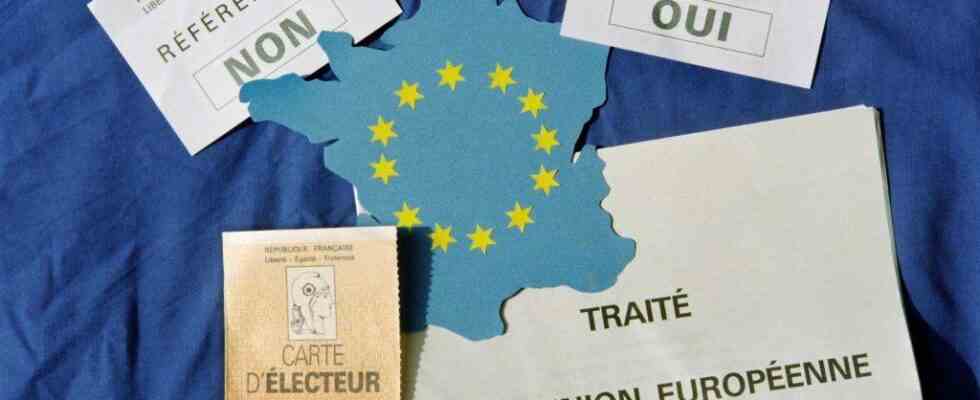You only turn 30 once in your life. And for this anniversary of the Maastricht Treaty, we can only wish him, as a gift, to be a little more loved. Even his birth certificate smelt of disenchantment: thirty years ago to the day, France validated the founding treaty of the European Union during a referendum with… 51% yes, proof that the agreement never came to fruition. is unanimous.
“This is the first time that a European treaty has entered into force with so much difficulty and tension, recontextualizes Myriam Benlolo Carabot, professor specializing in European law at the University of Nanterre. The ratification procedure was complicated in many countries, notably France, with a very passionate referendum campaign. »
The end of everything economic
All this agitation is explained by the historical scope of the treaty. Short remedial lesson with Tania Racho, doctor in European law and associate researcher at the University of Paris-Saclay: “European cooperation began with the Treaty of Rome in 1957, but it only concerns the economy. Between 1957 and 1993, the various developments only lingered to perfect this economic collaboration, nothing more. »
In this sense, the Maastricht Treaty constitutes a major shift, since it extends European cooperation to other fields. “Maastricht is the big leap: cooperation between States becomes political”, summarizes Florence Chaltiel, professor of public rights.
Tensions and crisis of passions
And that’s probably where this thirty-year disenchantment comes from. Because if the questions of cooperation on coal or steel did not until then have enough to inflame the hearts and the crowds, in 1992, more sensitive cords are solicited: “This treaty addresses important questions and considered at rightly by the States as affecting sovereign powers, intimately linked to their sovereignty. For example, cooperation in the field of justice, the police, the construction of a foreign policy, an asylum and immigration policy…”, explains Myriam Benlolo Carabot. Even in terms of the economy, the treaty initiates the creation of the single currency, again a loss of sovereignty for the Member States, adds Tania Racho.
“Sovereignty” is indeed the key word of all the tensions: “This is the first time that the Member States have ”given” their sovereignty to the European Union. We see at the time, in the various “no” campaigns, questions of sovereignty appear, themes that are still very present today”, points out Florence Chaltiel.
Maastricht is therefore a giant leap, but also, paradoxically, a “policy of small steps”: the idea is to build European solidarity by multiplying joint management in an increasingly growing number of areas. This treaty will be succeeded by many descendants: the Treaty of Amsterdam in 1997, of Nice in 2001, and of Lisbon in 2007. Each time, European cooperation is more and more advanced. A reproach often made in Maastricht, recalls Tania Racho: that of having launched a gear towards always more proximity.
The end of a taboo
In 2022, the contributions of Maastricht are still deeply divided. An Elabe poll from January dlast* showed that 39% of French people believe that the EU has as many advantages as disadvantages, 33% that it has more disadvantages than advantages, and 27% more advantages than disadvantages. On the single currency, 50% believe that its introduction was a bad thing for the country’s economic situation and purchasing power, and 49% believe that it is a good thing.
But in the end, more than disenchantment, Maastricht would suffer from a lack of interest. “At best, people know him by name but are unaware of his real contributions and what he is about precisely, since the population is not very passionate about European issues,” laments Florence Chaltiel.
However, things could change after thirty years of indifference. Myriam Benlolo Carabot explains: “The successive crises have shown people not only certain shortcomings of European cooperation but also its necessity and the added value of the EU on certain issues. There is undoubtedly today a certain support for the European project, as well as a fear of destabilization in the event of withdrawal from the EU, but this goes hand in hand with sometimes profound questioning”.
Same observation with Florence Chaltiel: “The harsh recent events, in particular the health crisis and the war in Ukraine, have put Europe back in the spotlight. Today, European sovereignty is no longer a taboo”. For the professor of public rights, these 30 candles above all make it possible to measure the progress made on the fundamental questions of state sovereignty. It also seems that your thirties are one of the best decades to live.

